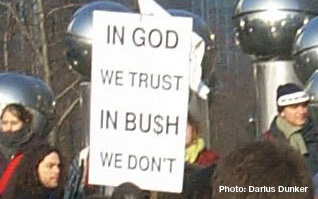 |
||||||||||
|
||||||||||
| ILRS Resolution on the Iraq Crisis |
The Executive Committee of the ILRS, meeting in Amsterdam on 5-6 February, adopted the following resolution on the crisis over Iraq.
The International League of Religious Socialists expresses its grave concern over the looming crisis of war in Iraq. We agree that insofar as the UNMOVIC inspectors find weapons of mass destruction, Iraq must disarm and relinquish these weapons, but the manner in which this is to be done is as important as the end result. The process and method of disarmament must be considered in light of the massive opposition throughout the world to a potential war, and in regard to the social tensions (e.g., Anti-Western, Anti-Muslim feeling) that this conflict has thus far exacerbated in our societies. It is essential that the disarmament of Iraq be carried out in a way that will be seen as fair in the eyes of the international community, with respect for international laws and conventions. - Any decision to take military action against Iraq must be taken by the UN Security Council, and not by any one nation or group of nations acting unilaterally. Adopted on 5 March 2003
|
|
|
The following is an abridged English translation of an article by Willy Spieler, editor of the Swiss religious socialist journal Neue Wege, and former president of the Social Democratic Party group in Zurich's Cantonal Assembly. U.S. President George W. Bush has used his State of the Union address not only to prepare the U.S. military for a war against Iraq, but to do so in the name of God. It is believed by Bush that the coming war is being waged to 'defend peace', and that God is on the side of the American military. Bush states that the version of 'liberty' that the American Right supports is not merely America's gift to the world, but that this version of American ideas and values is God's gift to all mankind, and that God has blessed the United States in this endeavour to spread that gift. But what kind of god is worshipped by Bush? And is any less damage done in the world, if Bush ignores his own nation's constitution in order to legitimise an illegal war by the use of religious rhetoric? |
| The Spirituality of Economics Kathy Galloway  |
On 13 February, Scottish theologian and anti-poverty activist Kathy Galloway delivered the Christian Socialist Movement's John Wheatley Lecture on the topic, The Spirituality of Economics. Thanks to Harry Watson, we are able to publish it here. The entire speech (approx. 6000 words) is available for download as an Acrobat PDF file. The following is the opening excerpt. |
| Report from the World Social Forum in Porto Alegre Andrew Hammer |
In January ILRS Secretary General Andrew Hammer attended the World Social Forum in Porto Alegre, Brazil. While attracting less media attention than the previous two forums, over 100,000 people from all over the world came to this week-long event to discuss everything from international trade agreements to the plight of indigenous groups in rural Brazil. Andrew's report follows below: Started in 2001 as a response to the World Economic Forum meetings held in Davos, Switzerland, the World Social Forum has attempted to bring together a coalition of NGOs, activists, and various representatives of the world's poorer nations in order to address the problems facing our world. Where the World Economic Forum (WEF) has crafted the neo-liberal policy that has driven global development over the last thirty years, the World Social Forum (WSF) is intended precisely to confront neo-liberalism and its adverse effects on people throughout the world, in both the North and the South. The WEF consists of a small group of influential world leaders who meet in committee rooms to plot the economic course of the world; the WSF consists of hundreds of diverse seminars, panels, discussions and debates all aimed at changing the course the WEF has so far plotted. The WSF is self-defined as 'an open meeting space for civil groups and social movements that are opposed to neo-liberalism, capitalist hegemony, and to any form of imperialism.' These are certainly grand goals, and one would think that if over 100,000 people come together to address them, then there might be some clear plan of action put forth on how to achieve them. But at this third World Social Forum, such a plan was nowhere to be found. For its sheer magnitude, the Forum is certainly an interesting and at times inspiring event, but it gave me more questions than answers. The organisation was quite chaotic, and the overall mood was more one of a festival rather than a meeting where people could make decisions and policy. Indeed, this is a complaint that has been raised more frequently now about the Forum, that it addresses issues, but can make no policy, nor can it provide the mechanisms to make policy regarding the institutions it seeks to confront (e.g., IMF, WTO). Susan George, one of the main organisers of the WSF, acknowledged this difficulty, saying 'Protests do not stop these institutions, binding laws do.' Another problem is that NGOs, for all of their talk about grassroots democracy, participatory values, and bottom-up development, are notoriously undemocratic and non-transparent in their own operations and structures. John Samuel of the National Centre for Advocacy Studies stated in a panel that NGOs should not be seen as the representatives of civil society, because most of them have been turned into private enterprises and providers of employment. He further cited one example of an NGO being given away as part of a dowry. Finally, the Forum's own structure, its own rules, and the selection of who is responsible for making the decisions about the Forum are a matter of concern. One basic rule which was very proudly touted by the organisers is a 'no politicians' rule, meant to ensure that the Forum is not swayed or influenced by anyone except the participants. Yet this rule was being openly flouted at the same time it was being enforced elsewhere. The newly elected president of Brazil, Luis Ignacio Lula da Silva, was not allowed to attend the Forum directly, but was allowed to address it by video. More significantly, the leader of the Belgian Socialist Party, Elio di Rupo, was involved in a plenary, as was a Socialist Party member of the French National Assembly. This is not to say that these politicians should not have been involved. However, if some politicians are going to be allowed and not others, then perhaps the organisers of the WSF should put aside this rule. One would think that the presence of parliamentary policy makers at the WSF, rather than the WEF, is something that the organisers and participants would desire. Would it not be better to have the world's leaders coming to Porto Alegre than to Davos? Since we are talking about leaders, it begs the question: who elects the leaders of the World Social Forum? And given the afore-mentioned problem with many NGOs, who exactly do these leaders represent? The intention of these questions is not to delegitimise the Forum, but rather to challenge it to do two things: (1) to move beyond rallies, panels, and speeches, towards genuine interaction and negotiation with those dominant forces who now decide how the majority of us now live, and (2) to more clearly address the question of its own representative legitimacy if it abandons the conventional method of electing political representatives to local and national bodies of governance. In order for the Forum to become more than just a celebration of the slogans and manifestos of the global left, it must find ways to connect with policy makers in meaningful ways that will actually help the people that these movements claim to represent. As it stands, the bold declarations from the WSF are no more meaningful than declarations from any other NGO or civil society group unless they can be attached to a clear method of action. The comments I heard from most people (even some panel speakers) reflected a sense of confusion about what the Forum was supposed to accomplish. Many expressed that aside from either speaking or listening to speeches, it was hard for people to feel connected to any sense of real work for change taking place. The WSF has accomplished a significant task by bringing so many people from so many nations together to address global issues. Now that it has done so, the time has come for it to move to the next level, from ideas to actions. The next opportunity will come in Mumbai, in January of 2004. |
This site was created and designed by Andrew Hammer
©2006 ILRS

